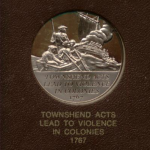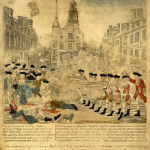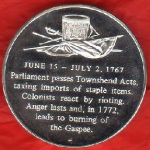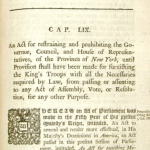Articles tagged with: Townshend revenue act
Townshend Acts »

Chronological events of the Townshend Acts.
Silver coins minted in the 1970’s. Historically, the burning of the Gaspee in 1772 was much removed from a reaction to the Townshend Acts of 1767.
January 1766 – New York refuses to comply with the
August 1766 – Charles Townshend assumed the position of Chancellor of the Exchequer.
June 1767 – had an overwhelming approval in parliament.
July 1767 – King George III signed the bill.
October 1767 – Boston Town Meeting under the leadership of Samuel Adams and James Ottis suggested residents and merchants to voluntarily …
Townshend Acts »

were named after Charles Townshend, the Chancellor of the Exchequer.
The acts were passed in June 1767 and were to be effective on November 20th, 1767.
The Townshend Acts consisted in a revenue measure; the New York restraining Act; the appointment of a 5 member American Board of Commissioners of Customs with headquarters in Boston; and the expansion of the Admiralty Courts to Boston, Philadelphia, Charleston in addition to the existing one in Halifax.
The imposed new tax on wine, fruits, chinaware or ceramic, white lead, painter’s colors, paper and pasteboard. …
Townshend Acts »

Trade with Great Britain had decreased from £2,378,000 to £1,634,000 by 1769. proved to be a complete failure; it did not increase revenue and confronted the population bringing them close to rebellion. Customs collections did not improve as expected because of the non importation agreement, in addition the cost of the increasing number of colonial military troops was becoming more expensive. Residents in the colonies, especially in Boston, Pennsylvania and New York were almost brought to the point of rebellion while British manufactures and merchants were having a hard …
Townshend Acts »

The 1767 Townshend Acts imposed new taxes on certain consumer products to raise revenue to pay salaries of colonial officials. It also created the American Board of Customs Commissioners and new admiralty courts to reinforce trade acts and collection of duties. In addition, the act allowed the supreme court of colonies to issue writs of assistance or search warrants on shipments to and from America.
Economic resistance
The colonists were divided over strategies of resistance and no organized opposition developed before the act went into effect on November 20th, 1767. As the …
Timeline of British Acts on America, Townshend Acts »

In 1766 Charles Townshend assumed the position of Chancellor of the Exchequer; he was an ally of Grenville and a strong supporter of colonial taxation, and decided to reattempt the collection of funds from British colonies.
In 1767 Townshend proposed a new set of measures known as the Townshend Acts. The Acts were passed in early June with an overwhelming support of parliament, and were to be effective on November 20th. After the the British had to show the colonies that Britain had the right to tax the colonies, raise …


